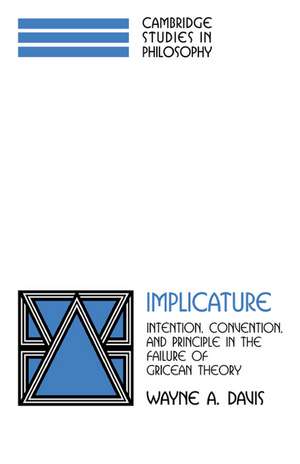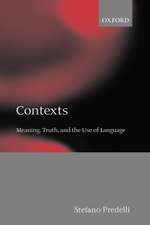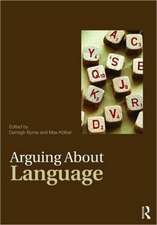Implicature: Intention, Convention, and Principle in the Failure of Gricean Theory: Cambridge Studies in Philosophy
Autor Wayne A. Davisen Limba Engleză Paperback – 28 iun 2007
| Toate formatele și edițiile | Preț | Express |
|---|---|---|
| Paperback (1) | 324.44 lei 6-8 săpt. | |
| Cambridge University Press – 28 iun 2007 | 324.44 lei 6-8 săpt. | |
| Hardback (1) | 690.46 lei 6-8 săpt. | |
| Cambridge University Press – 27 sep 1998 | 690.46 lei 6-8 săpt. |
Din seria Cambridge Studies in Philosophy
-
 Preț: 153.58 lei
Preț: 153.58 lei - 14%
 Preț: 769.32 lei
Preț: 769.32 lei -
 Preț: 225.97 lei
Preț: 225.97 lei -
 Preț: 323.18 lei
Preț: 323.18 lei -
 Preț: 173.58 lei
Preț: 173.58 lei -
 Preț: 433.93 lei
Preț: 433.93 lei -
 Preț: 262.35 lei
Preț: 262.35 lei -
 Preț: 387.37 lei
Preț: 387.37 lei - 11%
 Preț: 688.23 lei
Preț: 688.23 lei -
 Preț: 408.57 lei
Preț: 408.57 lei - 11%
 Preț: 445.99 lei
Preț: 445.99 lei - 11%
 Preț: 577.02 lei
Preț: 577.02 lei - 11%
 Preț: 423.03 lei
Preț: 423.03 lei -
 Preț: 273.50 lei
Preț: 273.50 lei - 11%
 Preț: 427.52 lei
Preț: 427.52 lei -
 Preț: 449.76 lei
Preț: 449.76 lei -
 Preț: 223.67 lei
Preț: 223.67 lei - 11%
 Preț: 691.14 lei
Preț: 691.14 lei - 14%
 Preț: 675.49 lei
Preț: 675.49 lei - 14%
 Preț: 696.12 lei
Preț: 696.12 lei -
 Preț: 239.48 lei
Preț: 239.48 lei -
 Preț: 319.40 lei
Preț: 319.40 lei -
 Preț: 378.11 lei
Preț: 378.11 lei - 14%
 Preț: 863.75 lei
Preț: 863.75 lei - 11%
 Preț: 691.81 lei
Preț: 691.81 lei -
 Preț: 433.93 lei
Preț: 433.93 lei - 11%
 Preț: 456.26 lei
Preț: 456.26 lei - 11%
 Preț: 611.45 lei
Preț: 611.45 lei - 11%
 Preț: 688.23 lei
Preț: 688.23 lei -
 Preț: 313.85 lei
Preț: 313.85 lei -
 Preț: 220.42 lei
Preț: 220.42 lei - 11%
 Preț: 687.59 lei
Preț: 687.59 lei -
 Preț: 209.44 lei
Preț: 209.44 lei -
 Preț: 284.89 lei
Preț: 284.89 lei -
 Preț: 281.12 lei
Preț: 281.12 lei - 11%
 Preț: 692.50 lei
Preț: 692.50 lei -
 Preț: 291.93 lei
Preț: 291.93 lei - 14%
 Preț: 740.63 lei
Preț: 740.63 lei - 11%
 Preț: 687.02 lei
Preț: 687.02 lei - 11%
 Preț: 525.56 lei
Preț: 525.56 lei - 11%
 Preț: 693.18 lei
Preț: 693.18 lei - 11%
 Preț: 688.92 lei
Preț: 688.92 lei - 11%
 Preț: 686.42 lei
Preț: 686.42 lei - 11%
 Preț: 693.78 lei
Preț: 693.78 lei - 11%
 Preț: 583.02 lei
Preț: 583.02 lei - 11%
 Preț: 686.53 lei
Preț: 686.53 lei -
 Preț: 394.56 lei
Preț: 394.56 lei
Preț: 324.44 lei
Nou
Puncte Express: 487
Preț estimativ în valută:
62.08€ • 64.99$ • 51.37£
62.08€ • 64.99$ • 51.37£
Carte tipărită la comandă
Livrare economică 05-19 aprilie
Preluare comenzi: 021 569.72.76
Specificații
ISBN-13: 9780521038065
ISBN-10: 0521038065
Pagini: 216
Dimensiuni: 140 x 215 x 12 mm
Greutate: 0.28 kg
Editura: Cambridge University Press
Colecția Cambridge University Press
Seria Cambridge Studies in Philosophy
Locul publicării:New York, United States
ISBN-10: 0521038065
Pagini: 216
Dimensiuni: 140 x 215 x 12 mm
Greutate: 0.28 kg
Editura: Cambridge University Press
Colecția Cambridge University Press
Seria Cambridge Studies in Philosophy
Locul publicării:New York, United States
Cuprins
Introduction; Part I. Concept and Theory: 1. The concept of implicature; 2. Theoretical importance; 3. Gricean theory; 4. Grice's razor; 5. Sufficiency; Part II. Differentiation: 6. Quantity implicatures; 7. Tautology implicatures; 8. Conjunction implicatures; 9. Idioms; 10. Non-Gricean speech; Part III. Determinacy and Calculability: 11. Background constraints; 12. The meaning constraint problem; 13. The rhetorical figure problem; 14. 'Indeterminate' implicatures; 15. Relevance implicatures; 16. Close-but implicatures; 17. Quantity implicatures: the possibility of ignorance; 18. Quantity implicatures: other possibilities; 19. Tautology implicatures; 20. Conjunction implicatures; 21. Conflicting principles; 22. 'Relevance' theory; 23. Modal implicatures; Part IV. Presumption and Mutual Knowledge: 24. The cooperative presumption condition; 25. The presumption of relevance; 26. Mutual knowledge; 27. Meaning versus communication; 28. Implicature and inference; 29. The recognition of implicature; Part V. The Existence of Implicature Conventions: 30. Conventions; 31. Quantity implicatures; 32. Tautology implicatures; 33. Conjunction implicatures; 34. Disjunction implicatures; 35. Modal implicatures; 36. Figures of speech; 37. Relevance implicatures; 38. Close-but implicatures; 39. Manner implicatures; 40. Interrogative and imperative implicatures; Part VI. The Nature of Implicature Conventions: 41. First-order versus second-order semantic conventions; 42. Idioms; 43. Indirect speech-act conventions; 44. The role of conversational principles; 45. The principle of antecedent relation; 46. The universality of implicature conventions; 47. Conclusion; References; Index.
Recenzii
'Implicature remains a stimulating and ambitious book which criticises Gricean pragmatics in a cogent and challenging way.' Cercles
Descriere
A systematic critique of the Gricean theory of implicature, an established doctrine in the philosophy of language.



















